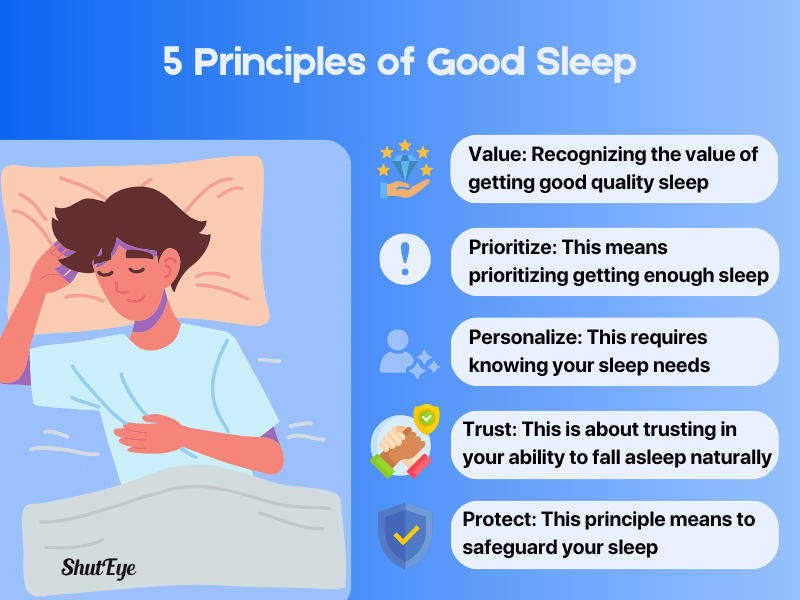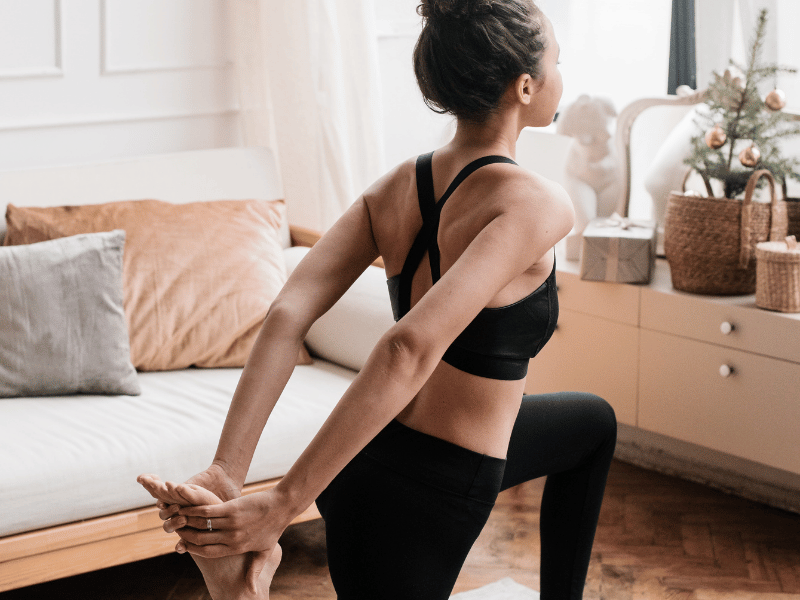


Sleep is well-known to be important for our physical and mental well-being. Unfortunately, not everyone gets to experience good sleep quality all the time. Practicing good sleep hygiene and forming good sleep habits are often advocated by sleep and health experts as a solution to poor sleep.
In this article, we’ll explore the 5 principles of good sleep, what are bad sleep habits and 10 sleep habits to practice at night. Keep on reading to find out more!

The ‘5 principles of good sleep’ is an approach proposed by neuroscientist, Dr Colin Espie, as a way to increase public awareness of the importance of taking care of your sleep health, and to be a first-line intervention for those with poor sleep or symptoms of insomnia [1].
The 5 principles include [1]:
While this approach is not intended to replace professional treatment for insomnia, it offers a foundation for cultivating better self-care practices. However, more formal research is needed to fully assess its effectiveness.

Bad sleep habits are pretty much habits that may disrupt your sleep cycle and result in you having trouble falling asleep, staying asleep, or even waking up in the mornings.
Some examples of bad sleep habits may look like:
Here are 10 good sleep habits that are designed to support a healthier and more restorative sleep at night:
An important sleep habit that can help to improve your sleep quality is maintaining a regular sleep schedule. Going to bed and waking up at the same time each day, even on weekends can help to regulate your body’s internal clock, also known as your circadian rhythm.
This will not only make it easier for you to fall asleep and wake up refreshed in the morning, but it will also help to reinforce your sleep-wake cycle, minimizing sleep disruptions, and leading to more restful sleep over time.
Creating a relaxing and soothing pre-sleep routine can help signal to your body that it is time to wind down for bedtime. Engaging in activities such as guided meditations, reading a bedtime story, listening to soothing sleep sounds, or taking a warm bath can help you relax and reduce stress before bedtime. By creating this, it will help to ensure that you are getting the good night’s sleep you need.

Another habit that you want to make sure of is to avoid using electronic devices before going to bed as they emit blue light. This blue light exposure can interfere with the production of the sleep hormone, melatonin. A lesser amount of melatonin produced means a higher chance of feeling more awake at night.
So, if you are looking for better rest, it’s best to avoid any screens at least an hour before bed. Instead, you want to focus on doing a relaxing activity that can help you prepare your body for slumber.

Exercising regularly can also help to enhance your overall sleep quality by reducing stress and anxiety. It is best to complete workouts earlier in the afternoon and avoid doing any vigorous exercise close to bedtime as intense physical activities can be stimulating and raise your energy levels which will make it harder for you to fall asleep.
Sticking to a balanced diet is not only beneficial for your physical well-being but it is also beneficial if you’re looking for better sleep quality. Opt for nutrient-rich foods or foods with melatonin content that can help to regulate your energy levels.
Try to avoid eating any heavy or spicy meals before bed as this could lead to acid reflux and discomfort, causing sleep disruption.
It is also important for you to limit your alcohol and caffeine intake before going to bed at night. Caffeine is a stimulant that can keep you up if consumed too close to bedtime. If you do need to consume caffeine, try not to consume it beyond early afternoon.
Alcohol may make you feel sleepy initially but it tends to cause sleep disruptions at night as it causes dehydration and increased heart rate.
While short naps can be refreshing, excessive or long daytime naps may interfere with your ability to fall asleep at night. If you feel the need to nap, aim for 20–30-minute naps earlier in the day to prevent disruptions to your nighttime rest.
Your sleep environment can also have an impact on your sleep quality. You want to create a sleep environment that is dark, quiet, and cool. To do so, you may consider using blackout curtains, a white noise machine, or aromatherapy. Also, using a comfortable mattress or bedding can help to cultivate a good sleeping experience.

Stress and anxiety can sometimes interfere with how well we sleep. Too much stress or anxiety can cause trouble sleeping. To combat this, you can try to incorporate stress management techniques into your daily routine by journaling, practicing mindfulness, or doing some deep breathing exercises.
Another thing that you want to avoid doing is to lay in bed when you are not tired yet. Doing this will only lead to more frustration and can hinder your ability to fall asleep. Instead, you want to only go to bed when you feel sleepy. If you can’t seem to fall asleep after 20 minutes as passed, get up and try to do some relaxing activities until you start to feel sleepy.
By practicing good sleep habits such as the ones above, you may find that your sleep quality will start to improve and you will start to feel more refreshed in the mornings.
You can also use the ShutEye® app to help you get started on your journey to better sleep. ShutEye® uses a patented sleep-tracking technology to monitor your sleep patterns and offers tips to improve it each night. Try it now for FREE!
Espie, C. A. (2021) The ‘5 principles’ of good sleep health. Journal of Sleep Research, 31(3), e13502. Available at: https://doi.org/10.1111/jsr.13502